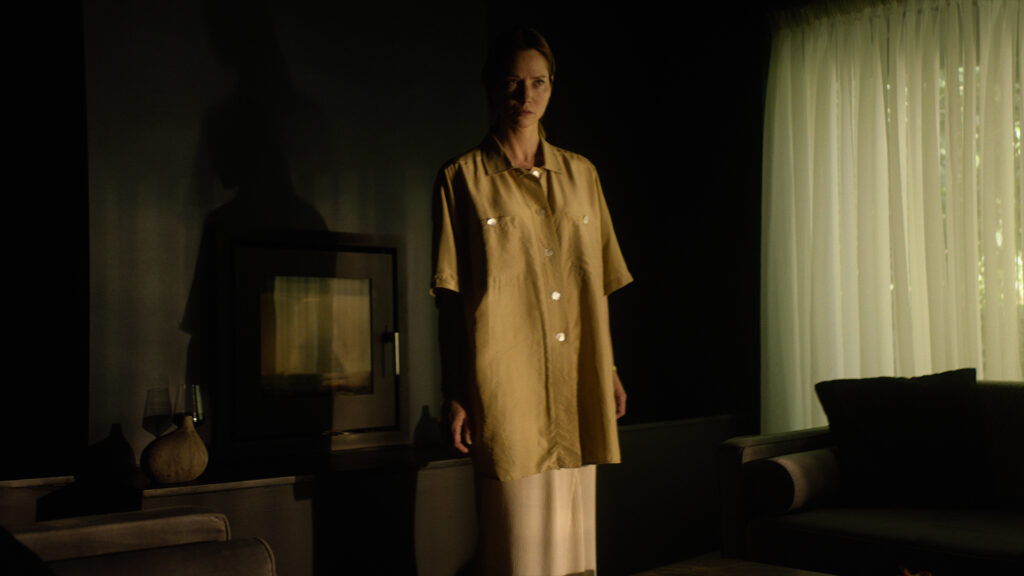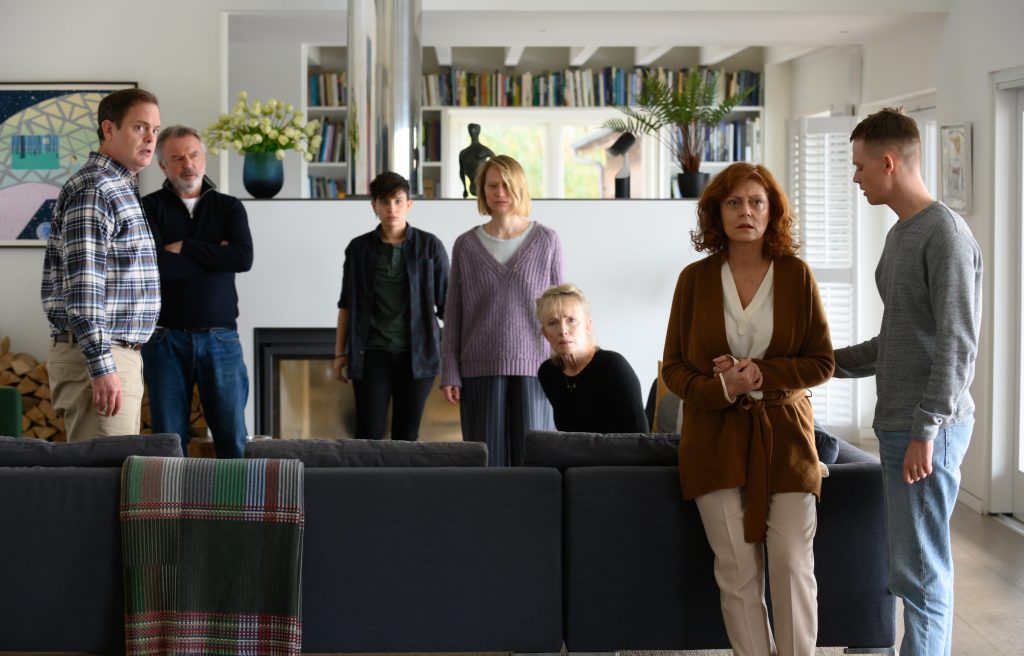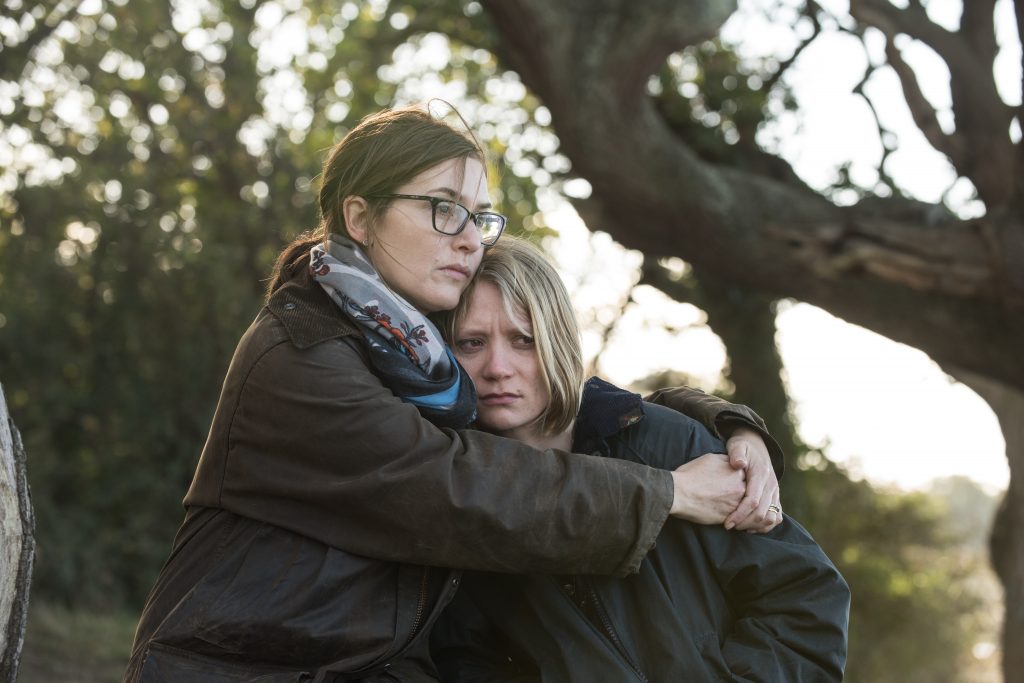March 29, 2022
by Carla Hay

Directed by Ruth Paxton
Culture Representation: Taking place primarily in an unnamed part of England, the horror film “A Banquet” features a cast of predominantly white cast of characters (with a few black people and Asians) representing the middle-class.
Culture Clash: A widow who’s raising two teenage daughters is alarmed when one of the daughters refuses to eat, but this daughter strangely doesn’t lose any weight after starving herself.
Culture Audience: “A Banquet” will appeal primarily to people interested in horror movies that intersect body horror and science fiction, but be prepared for a slow-paced, clumsily conceived movie that doesn’t live up to its potential.

Using an eating disorder as a plot device for a horror movie is a slippery slope that “A Banquet” mishandles in uninspired ways, and it essentially sinks the movie. If you watch this disappointing film, be prepared to see a lot of repetitive scenes where a teenage girl acts spaced-out while she refuses to eat, but she doesn’t lose weight. It could have been an interesting metaphor for something artistically provocative, but the big “reveal” of why this teenager is acting so strangely is actually very underwhelming. “A Banquet” didn’t need an eating disorder angle, which comes across as a cheap gimmick to get attention for this movie.
Directed by Ruth Paxton and written by Justin Bull, “A Banquet” is Paxton’s feature-film directorial debut. The movie has recurring themes about mother-daughter relationships, but so much of how it’s presented in “A Banquet” comes across as very pretentious and phony, all because this movie is desperately trying to be a high-minded, artsy horror film. The movie also doesn’t adequately explore the impact that death and grieving can have on a family. Instead, the “A Banquet” becomes fixated on the eating disorder gimmick to try to make the movie’s horror mystery more interesting than it actually is.
In “A Banquet,” which takes place in an unnamed part of England, the central family suffers a devastating loss in the beginning of the movie. Holly Hughes (played by Sienna Guillory) is taking care of her terminally ill, bed-ridden husband Jason Hughes (played by Richard Keep) in a home-care setup in the family living room. The couple has two teenage daughters: rebellious Betsey Hughes (played by Jessica Alexander), who’s about 17 years old, and obedient Isabelle Hughes (played by Ruby Stokes), who’s about 16 years old.
Soon after Holly feeds her husband a meal, he dies. Isabelle witnesses this death too. The death is barely mentioned in the movie again, so there’s really not much context given on what kind of husband and father Jason was. There are also no flashbacks showing what his relationship was like with his wife and daughters.
Instead, the movie’s focus abruptly shifts to Betsey’s perspective. Viewers see that she’s met with a guidance counselor (played by Jonathan Nyati) at her school. The counselor suggests that Betsey take a “gap year,” since Betsey doesn’t know what she wants to do after she graduates from high school.
Betsey is then shown at a house party with other teenagers. She’s hanging out with three guys, who take out some white powder from a small plastic bag and chop out some lines to snort. They offer Betsey some of this unnamed drug. She snorts it, and immediately says that her nose feels like it’s burning. The guys laugh and tell Betsey that what she snorted is really powdered alcohol.
And then, things start to get weird. At this party, Betsey goes outside and collapses in the backyard. The camera then pans up, and something appears to leave Betsey’s body. She regains consciousness, but for the rest of the movie, Betsey often acts like she’s in a trance. She also starts to experience what seem like hallucinations, such as hearing incoherent noises coming from food that’s in a frying pan.
Meanwhile, more of Betsey’s “spacing out’ continues. Isabelle is involved in ice skating, so when Holly and Betsey watch Isabelle practice at a rink one day, Betsey goes into a complete trance, as if she can’t see or hear anything around her. It’s one of many incidents which cause her family members to question Betsey’s mental stability.
Betsey also refuses to eat. At her mother’s insistence, Betsey sees a doctor (played by Deka Walmsley) for a medical exam, because Holly suspects that Betsey has anorexia nervosa. Betsey tells the doctor, “My body shuts off. I haven’t really been eating. I just get nauseous around food since it started.”
What exactly is “it”? That question is answered at the end of the film, but Betsey keeps dropping hints that she thinks that she’s being summoned to do something important. Betsey also repeatedly goes to a wooded area, as if something is compelling her to go there.
As Betsey continues to go into trances and refuses to eat, her mother Holly becomes increasingly alarmed and angry. Meals at the family dining table become a battleground where Holly tries but fails to get Betsey to eat a full meal. If Betsey does manage to eat anything, it’s usually a very small bite, but it’s questionable if she swallows the food. Betsey’s friend Dominic (played by Kaine Zajaz) doesn’t seem to know what’s going on with Betsey either.
During all of this family turmoil, Holly’s mother June (played by Lindsay Duncan) comes over to the Hughes home for a visit. June doesn’t seem as upset as Holly is about what’s going on with Betsey. June tells Betsey, “We’ve all got problems, darling. Don’t be the show.” It’s at this point, it’s obvious that June knows more than she’s willing to tell at that particular time.
During a private conversation between Holly and June, where they are discussing Betsey, Holly says to June: “Are you suggesting that Betsey is possessed by a demon?” June then says to Holly: “Quite the opposite. I think Betsey has possessed this family—you most of all.”
Unfortunately, “A Banquet” has sluggish pacing that repeats the eating disorder/trance scenarios without furthering the story very well. The character development is non-existent, although June does provide some sarcastic quips from time to time that liven up the story. Isabelle and her thoughts and feelings are basically shunted to the side, almost rendering her as a useless character. By the end of the movie, viewers still won’t get a sense of who Isabelle is, other than being somewhat of a bystander in her own family.
“A Banquet” has some striking close-ups of food, which are intended to make viewers either feel hungry or sickened. Food is used in the movie as a symbol for earthly needs and primal desires on a human level. In one scene, Holly has a nightmare about seeing smeared food with teeth coming out of it. The movie’s cinematography from David Lidell is actually quite good, but “A Banquet” is truly a case of style over substance.
While watching “A Banquet,” viewers might ask themselves, “What does all of this mean? Where is this story going?” The answers and the payoff aren’t as rewarding as perhaps the filmmakers intended. The end result is a mostly boring horror movie that wastes a lot of time being more concerned with how scenes look, rather than viewers knowing enough about the characters to care about what happens to the people in the movie.
IFC Films/IFC Midnight released “A Banquet” in select U.S. cinemas, on digital and VOD on February 18, 2022.


